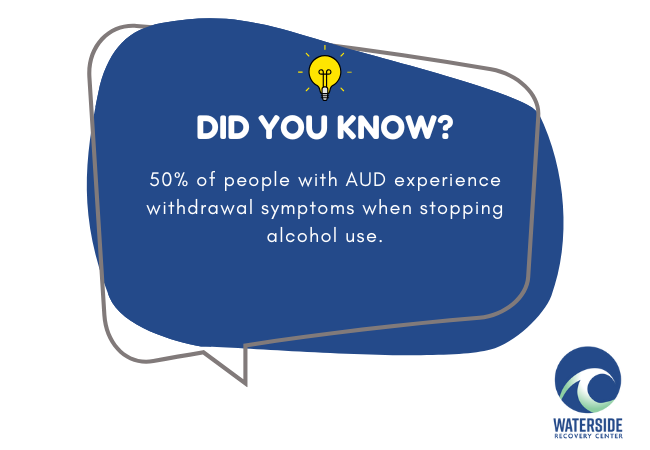Alcohol addiction is a serious and complex disease that impacts millions of people across the United States. For many, quitting alcohol is not just about willpower—it requires comprehensive treatment, medical supervision, therapy, and long-term support.
If you or a loved one is struggling with alcohol dependence, understanding what to expect from an Alcohol Addiction Treatment Program in Massachusetts can help you take the first step toward a healthier, sober life.
At Waterside Recovery, a leading Massachusetts addiction treatment center, we offer a full continuum of care, from detox and inpatient rehab to Partial Hospitalization Programs (PHP) and outpatient treatment. This guide will walk you through every phase of treatment and what to expect at each stage.
Understanding Alcohol Addiction: Why Treatment is Necessary
Alcohol Use Disorder (AUD) is a chronic and progressive disease that affects the brain’s reward and decision-making centers, leading to uncontrolled alcohol consumption despite negative consequences.
Signs of Alcohol Addiction
- Inability to control or limit drinking
- Experiencing withdrawal symptoms when not drinking
- Drinking in risky situations (e.g., before driving or at work)
- Neglecting responsibilities, relationships, or personal health due to alcohol use
- Developing a high tolerance (needing more alcohol to achieve the same effects)
- Trying to quit but experiencing relapses
The Dangers of Untreated Alcohol Addiction
Without treatment, alcohol addiction can lead to serious physical and mental health issues, including:
- Liver disease, including cirrhosis
- Heart disease and high blood pressure
- Increased risk of stroke and brain damage
- Depression, anxiety, and suicidal thoughts
- Increased likelihood of injury, DUI arrests, or legal issues
- Relationship breakdowns, job loss, and financial difficulties
The good news is that with professional treatment, individuals can achieve long-term sobriety and a better quality of life.
Step 1: Medical Detox – The First Phase of Recovery
Detoxification is the process of removing alcohol from the body and managing withdrawal symptoms. Alcohol withdrawal can be dangerous, and in some cases, life-threatening, which is why medical supervision is crucial.
Common Alcohol Withdrawal Symptoms
- Anxiety and restlessness
- Sweating and tremors
- Nausea and vomiting
- Hallucinations
- Seizures (in severe cases)
- Delirium Tremens (DTs) – A severe reaction that can cause confusion, agitation, and cardiovascular collapse
The Importance of a Medically Supervised Detox
At Waterside Recovery, our detox program includes:
- 24/7 medical monitoring to manage withdrawal symptoms safely
- Medication-assisted treatment (MAT) to ease discomfort and reduce cravings
- Emotional and psychological support to prepare for further treatment
Once detox is completed, individuals transition into a structured treatment program for long-term recovery.
Step 2: Selecting the Right Alcohol Addiction Treatment Program
After detox, individuals enter a comprehensive alcohol addiction treatment program designed to address the root causes of addiction and develop relapse prevention strategies.
Inpatient Rehab – A Structured, Immersive Approach
Inpatient rehab provides 24/7 medical and therapeutic care in a structured environment free from alcohol-related triggers.
Best for individuals who:
- Need constant supervision and support
- Have severe alcohol addiction
- Require treatment for co-occurring mental health disorders
- Have experienced multiple relapses
Partial Hospitalization Program (PHP) – A Flexible, Intensive Option
A Partial Hospitalization Program in Massachusetts (PHP) is an ideal step-down from inpatient rehab or an alternative for those needing structured support while living at home.
Benefits of PHP for Alcohol Addiction Treatment:
- Intensive therapy sessions during the day
- Access to medical and psychiatric care
- Helps individuals transition from inpatient rehab to independent recovery
- More affordable than inpatient rehab while still providing comprehensive support
At Waterside Recovery, our PHP in Massachusetts offers individual therapy, group counseling, medication management, and relapse prevention training.
Outpatient Treatment – Maintaining Sobriety While Living at Home
For those who have completed inpatient rehab or PHP, an Outpatient Treatment Program in Massachusetts provides flexible, ongoing support while allowing individuals to maintain work, school, and family responsibilities.
Outpatient treatment includes:
- Intensive Outpatient Programs (IOP) – Therapy several days a week while transitioning back to daily life
- Standard Outpatient Therapy – Weekly counseling sessions and peer support groups
- Relapse Prevention Planning – Strategies to avoid triggers and manage cravings
Step 3: Therapy and Treatment Approaches in Alcohol Addiction Recovery
At Waterside Recovery, we use evidence-based therapies that help individuals develop coping skills, emotional resilience, and healthier habits.
1. Cognitive-Behavioral Therapy (CBT)
- Identifies negative thought patterns that contribute to alcohol use
- Teaches healthy coping strategies to handle stress and cravings
2. Dialectical Behavior Therapy (DBT)
- Focuses on mindfulness, emotional regulation, and distress tolerance
- Helps individuals build better relationships and improve self-awareness
3. Medication-Assisted Treatment (MAT) for Alcohol Addiction
Certain FDA-approved medications can help prevent relapse, including:
- Naltrexone – Reduces alcohol cravings
- Acamprosate – Helps restore brain balance post-detox
- Disulfiram – Causes unpleasant effects when alcohol is consumed

The Role of Family and Community Support in Recovery
How Family Involvement Helps in Alcohol Addiction Treatment
- Encourages open communication and trust
- Provides emotional and practical support
- Helps individuals repair damaged relationships
- Family therapy educates loved ones about addiction, enabling them to offer proper support
Sober Communities and Peer Support Groups
- Alcoholics Anonymous (AA) and SMART Recovery provide ongoing peer support
- Sober living homes offer structured, alcohol-free environments
- Engaging in social activities, hobbies, and fitness programs can help build a healthier lifestyle
Step 4: Life After Treatment – Building a Sober Future
Long-term recovery requires ongoing commitment, accountability, and support.
Relapse Prevention Strategies
- Identify triggers and develop healthy coping mechanisms
- Maintain regular therapy sessions and attend support groups
- Prioritize self-care, stress management, and mindfulness techniques
Aftercare Programs at Waterside Recovery
We offer:
- Outpatient therapy and relapse prevention counseling
- Alumni programs to maintain connections with the recovery community
- Career and life-skills coaching to support personal and professional goals
Why Choose Waterside Recovery for Alcohol Addiction Treatment in Massachusetts?
At Waterside Recovery, we understand that overcoming alcohol addiction is a deeply personal and challenging journey. That’s why we provide compassionate, evidence-based care tailored to your unique recovery needs. As a leading Massachusetts addiction treatment center, we are dedicated to helping individuals reclaim their lives and achieve long-term sobriety.
What Sets Us Apart?
1. Comprehensive, Personalized Treatment Plans
Every individual’s journey to recovery is different. Our Alcohol Addiction Treatment Program in Massachusetts is customized to fit your specific needs, ensuring you receive the right level of care—whether it’s detox, inpatient rehab, Partial Hospitalization Program (PHP), or outpatient treatment.
2. Full Continuum of Care
We provide a seamless treatment experience, guiding you through each phase of recovery:
- Medical Detox – Safe and supervised withdrawal management
- Inpatient Rehab – 24/7 support in a structured environment
- Partial Hospitalization Program (PHP) – Intensive therapy with flexibility
- Outpatient Treatment – Continued support while reintegrating into daily life
- Aftercare & Alumni Support – Long-term relapse prevention and sober living support
3. Experienced & Compassionate Clinical Team
Our licensed doctors, therapists, and addiction specialists bring years of experience in treating alcohol addiction. We provide one-on-one therapy, group counseling, and medical support to help you heal physically, emotionally, and mentally.
4. Evidence-Based & Holistic Treatment Approaches
We use a combination of scientifically proven therapies and holistic practices to support long-term recovery:
- Cognitive-Behavioral Therapy (CBT) & Dialectical Behavior Therapy (DBT)
- Medication-Assisted Treatment (MAT) to reduce cravings and prevent relapse
- Mindfulness, Yoga, and Meditation to improve emotional regulation
- Nutritional Counseling & Fitness Programs to rebuild overall health
Conclusion
Overcoming alcohol addiction is challenging but achievable with the right support. At Waterside Recovery, our Alcohol Addiction Treatment Program in Massachusetts provides comprehensive, personalized care to help individuals achieve lasting sobriety.
If you or a loved one is struggling with alcohol addiction, don’t wait to seek help. Call us today at 866.671.8620 to learn more about our programs and take the first step toward a healthier, alcohol-free life. At Waterside Recovery, we are committed to providing the highest quality care to help you regain control of your life.
FAQ About Alcohol Addiction Treatment
What is an Alcohol Addiction Treatment Program?
An Alcohol Addiction Treatment Program is a structured recovery plan that includes medical detox, therapy, counseling, and support groups to help individuals stop drinking and maintain long-term sobriety.
How do I know if I need alcohol addiction treatment?
You may need treatment if you:
- Struggle to control your drinking
- Experience withdrawal symptoms when you stop drinking
- Have relationship, work, or legal problems due to alcohol use
- Tried to quit drinking but relapsed multiple times
What is the first step in alcohol addiction treatment?
The first step is medical detox, where alcohol is safely removed from the body under medical supervision. This helps manage withdrawal symptoms and prepares you for further treatment.
What happens after detox?
After detox, individuals transition into a structured treatment program, such as:
- Inpatient Rehab – 24/7 care in a residential setting
- Partial Hospitalization Program (PHP) – Intensive therapy during the day while returning home at night
- Outpatient Treatment – Continued therapy with flexibility for work or school
What is a Partial Hospitalization Program (PHP) for alcohol addiction?
A Partial Hospitalization Program in Massachusetts is a highly structured day treatment program where individuals receive intensive therapy, medical support, and relapse prevention strategies without needing 24/7 inpatient care.
How long does alcohol addiction treatment take?
The length of treatment varies based on individual needs:
- Detox: 5-10 days
- Inpatient Rehab: 30-90 days
- PHP: 4-8 weeks
- Outpatient Treatment: Several months or longer
Does insurance cover alcohol addiction treatment?
Many insurance providers cover alcohol addiction treatment, including detox, inpatient rehab, PHP, and outpatient programs. Call 866.671.8620 for a free insurance verification.


